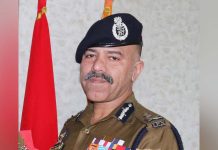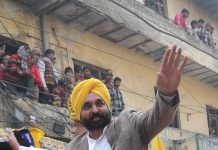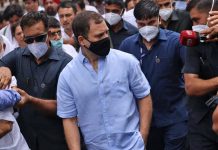
Davinderpal Singh Bhullar, then a professor of engineering in Punjab, had his 9/11 moment eight years before the rest of the world did. On 11 September 1993, a bomb went off half a mile from Parliament killing nine people, including two bodyguards of a Congress leader who was its alleged target and who survived. Two weeks before the other, bigger 9/11 of 2001, a trial judge in New Delhi said Bhullar should hang for his alleged role in the 1993 bombing. Now, a dozen years after his conviction, Bhullar’s chances to escape the gallows are thinnest ever. His family rests its hope in arguing that he is not fit psychologically and is, therefore, ineligible for the hanging. “He did not recognise me,” says his wife, Navneet Bhullar, who met him this week at New Delhi’s Tihar Central Prison. “His conviction devastated him as there was no evidence.”
Bhullar’s lawyer KTS Tulsi, one of India’s foremost human rights counsel, believes the case can still be argued in his favour on merit. As TEHELKA goes to print, Tulsi is preparing a petition to seek a review of a Supreme Court ruling last week that upheld then President Pratibha Patil’s rejection of Bhullar’s petition for mercy in 2011. Tulsi’s optimism stems from the fact that, back in March 2002, one of the three SC judges who heard Bhullar’s appeal against his conviction had acquitted him.
When Bhullar’s petition for a review came up before the same three judges in December 2002, the dissenting judge stuck to his ruling, as did the other two judges who had months earlier upheld his death sentence. Yet, the majority judgment on the review petition explicitly said that the views of the dissenting judge should be considered in deciding Bhullar’s mercy petition whenever it comes up subsequently. The reason was that the dissenting judge, MB Shah, being senior-most, was also the presiding judge.
“The government should have placed before the president the grounds on which the presiding judge acquitted Bhullar,” says Tulsi. Also, he says, the fact of the “split decision should have taken the conviction out of the ambit of the ‘rarest of rare cases’”. Tulsi’s reference is to a foundational ruling the SC gave exactly 30 years ago that said capital punishment should only be given in the “rarest of rare cases”. Another principle that ruling established is that there should be “incontrovertible” proof of the guilt of the accused. “But how can the proof be incontrovertible if a judge acquits him?”
Bhullar, now 47, was arrested in 1995 at the New Delhi airport after Germany rejected his plea for asylum and deported him. Delhi Police claimed he confessed to his role in the 1993 bombing. Bhullar said he was tortured and made to sign a blank paper. Strangely, the trial court acquitted his only other co-accused, who had been extradited from the US. Unlike Bhullar, the co-accused was not tried under TADA, a counter- terrorism law. TADA was widely abused for years before human rights activists forced the government to let it lapse, ironically in 1995, months after Bhullar was arrested under it. Since then, Germany has officially regretted its decision to deport him.
On 17 April, Amnesty International urged New Delhi not to execute Bhullar by saying his trial fell “far short of international standards for a fair trial”. His wife, who is a Canadian Sikh, says Ottawa has written to the Indian government against Bhullar’s death sentence. She has met with lawyers across Europe and North America, and now plans to move the UN.
But there is little in India’s judicial annals to offer optimism. Should the SC dismiss the upcoming review petition against its decision upholding the presidential rejection, Bhullar can go back to the judges with what is known as a “curative” petition. Such a petition, explains Tulsi, seeks to cure a “serious defect because so long as a (defective) judgment remains operative, it will continue to create confusion as it has precedent value”. If all else fails, Bhullar can file a second appeal for clemency with the president on grounds that he believes did not exist when he had filed his first.
That ground can only be his reportedly failing mental health.













